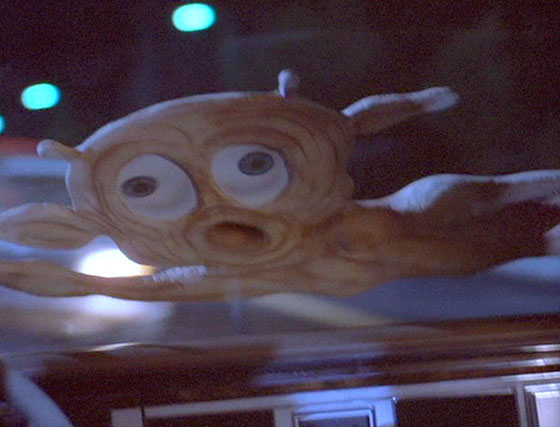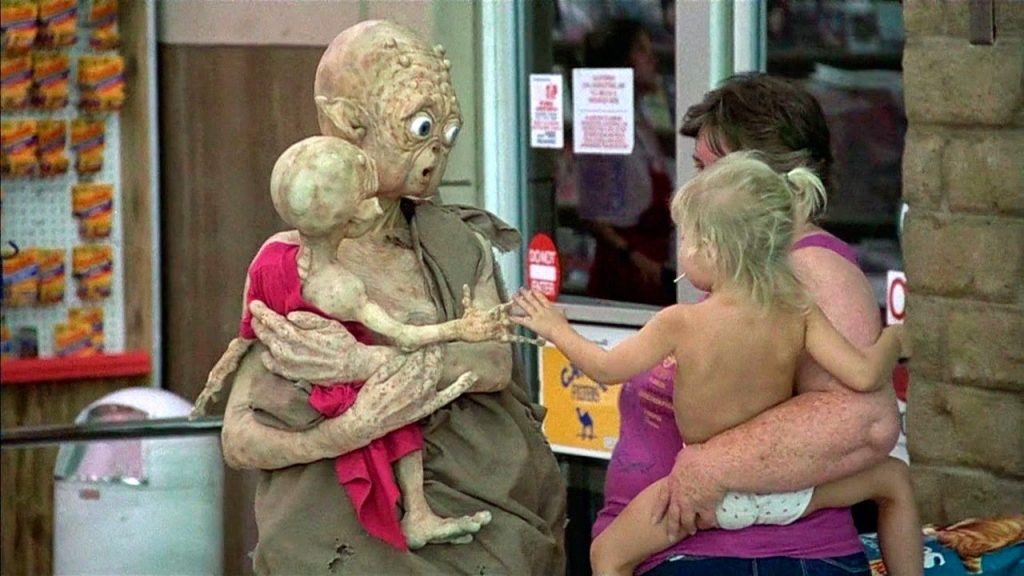In 1988, director Stewart Raffill released his follow up to the moderately successful The Philadelphia Experiment. Raffill’s career has never been one to garner awards attention, having delivered mostly genre fare that has left little in the viewers memory. Yet, in 1988, he joined the great Blake Edwards as the co-recipient of an award that many maybe don’t want to have – the Worst Director award at the Razzies. Beating out Michael Dinner for Hot to Trot, Roger Donaldson for Cocktail and Peter MacDonald for Rambo III; Edwards won his award for his film Sunset, while Raffill won his award for a little film called Mac and Me.
Now, at that same ceremony, Mac and Me went on to lose (or win?) the Worst Film award to Donaldson’s 5% on Rotten Tomatoes film, Cocktail – a film which has gone on to have a slight cultural influence with its cocktail concoction scene. History has been kinder to Cocktail, with it becoming appreciated for what it is – an ok film with a charismatic lead. Yet, if you were to ask people on the street what the worst film of the bunch that was nominated (Caddyshack II 4%, Rambo III 36%, Hot to Trot 0%, Cocktail 5%, Mac and Me 0%), then odds are they would say that Mac and Me was the worst out of the bunch. Hands down. It’s a stinker. Ask Paul Rudd, he’ll tell you.
I’m of the firm belief that there is no such thing as a ‘guilty pleasure’. The ‘Urban Dictionary’ definition of guilty pleasure is Something that you shouldn’t like, but like anyway. Well, why shouldn’t I like Mac and Me?
It sits on Rotten Tomatoes with a solid zero percent rating, meaning it has no positive reviews. On IMDb it has a user average of 3.4/10. Understandably then, after all this time, many will gladly deride the film as being a truly terrible film. Comparisons to Spielberg’s E.T. are apt – a young boy befriends a lost alien, junk food is consumed as a way of bonding, and inevitably, chaos ensues. Other complaints include the somewhat average design of the aliens; the obvious latex of the costumes taking away from the believability of the creatures, and the janky animatronics giving a disturbingly unnatural feel to the movements. Then, of course, there’s the unexpected dance number in a McDonald’s that seems to come out of nowhere… or does it?
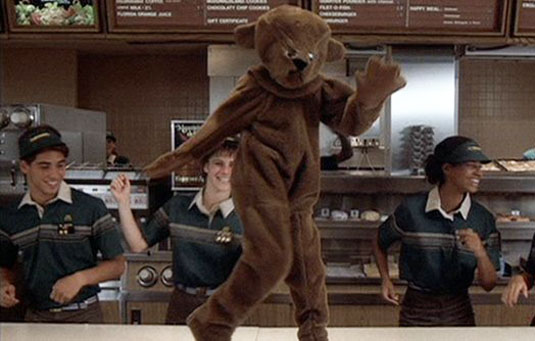
But, with all of that in mind, it’s a film that I have great affection for. Let’s be clear first of all – this is not a masterpiece of cinema, but on the same hand, it is also not a completely incompetent film. Technically, there’s little to complain about – there’s some nice camera work and Alan Silvestri’s score is fine. Acting on the other hand is not exactly the best with the two young actors – Jade Calegory and Lauren Stanley – providing the best young child performances they can muster. The story cribs a lot from E.T., but manages to throw its own spin on the ‘lost alien’ story.
For all its criticisms, and the regularity that Paul Rudd rolls out clips as a punchline, Mac and Me isn’t actually all that bad. In fact, it’s one of the most progressive films to come out of the eighties, promoting the employment of disabled actors in lead roles, while also having a pro-immigration message at its core. Yes, there’s even a healthy dose of pro-consumerism and pro-corporatisation as well, but more on that later on.
First up: the casting of Jade Calegory as the lead, Eric Cruise. Calegory is wheelchair bound due to having had spina bifida. After sixteen operations, including a spinal fusion, Calegory had to spend a fair amount of his childhood in a full body cast. He wanted to prove that kids in wheelchairs weren’t lazy and were just as capable of doing the same things that full bodied kids were able to, and through his role as Eric in Mac and Me he was able to do just that.
As Calegory’s mother said in a People interview, ‘the movie shows that these kids can get in a chair and play. They don’t have to sit in front of a TV. Jade just plays the part of a regular kid, and it took a lot of courage to do that.’ One of the modern complaints about films and television is the under-representation of minority groups in key roles. If only Mac and Me were a successful film, then it could ideally have helped boost the representation of disabled actors in cinema. As it is, many roles that require the actor to be in a wheelchair, or not have full use of their body, are portrayed by able bodied actors (namely, The Theory of Everything or the offensive Me Without You).
The difference between those roles and the casting of Calegory in Mac and Me is that the fact that Eric is in a wheelchair does not define him as a character. It doesn’t exclude him from living the life that he wants to live, where many films with characters who are not able bodied are restricted in life, with the film showing that their life is hampered and possibly even ruined by the fact they are not able bodied. Here, Eric’s mother Janet (Christine Ebersole) is supportive of her son, having moved across the country from Illinois to California and into a wheelchair friendly home (well, that is besides the massive drop off into a ravine at the back of the house).
The set up for the Cruise families story is simple – they’re moving to a new state, and a new home, after the separation of Janet and the Cruise boys father (who is only seen in a family photo Eric keeps by his bed). The set up for Mac’s family is a little different. On a planet far away from Earth, they encounter an American spaceship that has landed to collect some rocks – think a larger version of the Mars Rover. At first, Mac’s family set up to defend themselves from this foreign entity by throwing rocks at it, only to find that it harbours no aggression towards them.
They move closer to the ship, and realising that it’s just there to just collect rocks they assist it with its task. One of the larger rocks that they offer up the ‘invading’ unit is later claimed to ‘look great’ by one of the scientists back on Earth. One could possibly read a little too much into this situation where a spaceship – American, of course – has invaded a foreign land for their own benefit. As the ship sucks up air, it manages to suck up Mac and his family – the first sign of the bizarre flexibility of Mac’s race.
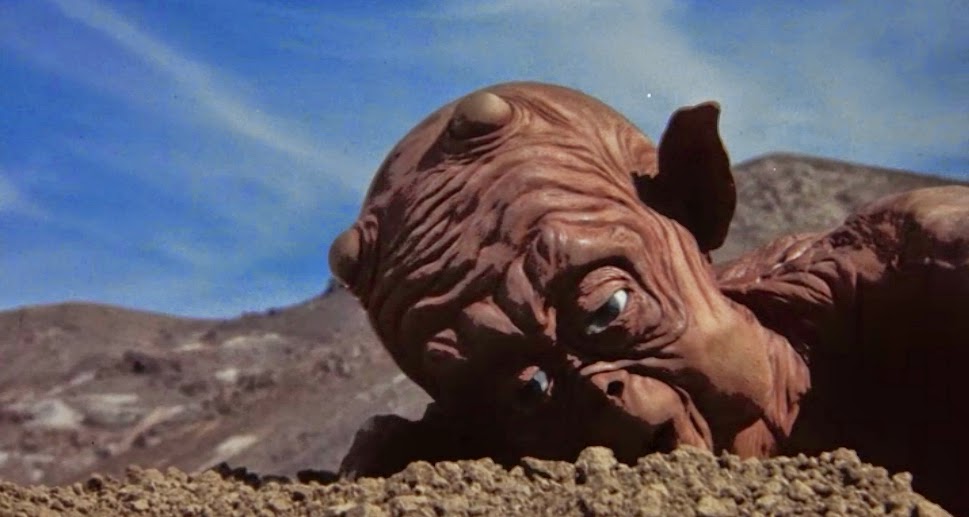
On the subject of Mac’s appearance for a moment – many have complained about the creature design of Mac, with his giant bulbous eyes, pointed ears and straw sized mouth. Unlike many alien invasion films, we’re presented with a good idea of what Mac’s planet looks like – and from that small representation we’re able to gather what kind of evolution would have had to have taken place for these creatures to turn out the way they did. They gather their food by spiking a hole in the ground and drinking whatever the fluid is that is there. Their skin is weathered and tanned, almost as if it’s a camouflage to help them blend in with the stark environment they live in.
Part of the argument against certain creature designs can be read as pertaining to that which wholly embraces the creationist theory. That is, shouldn’t a creature look visually appealing, and relatable, to that of what us humans look like? Shouldn’t the anthropomorphic traits of creature design be heightened to create a stronger relationship between viewer and film?
Unless that creature has specifically been created within the context of a story, then why is it not possible for a creature within a film to look however the designers wish them to look? Is it not enough to say, plug in No Man’s Sky and base a film on whatever abomination that game conjures up. To say that a creature is ugly, or illogical, goes against whatever possible evolution has occurred within the world that that creature has come from. When people complained about the unsympathetic alien in Super 8, they were complaining because it was a creature that the kids in the film had grown to sympathise with, and the creature itself was reasonably monster-esque. Much the same as the kids within Mac and Me who immediately throw aside any biases that they may have and want to support and help Mac and his family.
There is the preconceived notion that within a family film, the non-human creature should be child-friendly, or rather, be an approachable, toy-friendly looking creature. While Mac does technically tick some of those boxes, there is no denying that the movements and body type of the creatures is eerie and can be off putting to watch. Their distended bellies and awkward gait, combined with elongated fingers and an unsettling manner of communication gives these humanoid looking aliens an almost uncanny valley feeling. They look like humans, but clearly they are not. It’s natural for our mind to reject things that are abnormal, or different, or things that are not familiar to us.
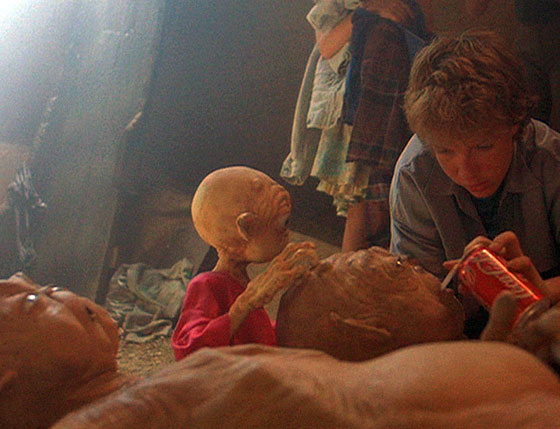
That’s not to say that unnatural looking aliens can’t be empathetic creatures. One simply needs to look at Abbott & Costello in Denis Villeneuve’s Arrival to see that the squid like creatures are as empathetic as Spielberg’s E.T. creation. Sure, the whole point of Arrival was to show that through communication and the use of unconventional language – or rather, pushing ourselves past accepting solely base human relationships – that we can be united together in ways that we couldn’t imagine. The unconventional manner that Mac communicates to Eric in relation to where his family is – namely, but making pseudo-wind farms out of straws – is a barrier that Eric has to conquer. It is only when Eric sees the wind farms that he truly recognises what Mac was trying to communicate. Granted, Amy Adams Louise Banks character has much more difficult barriers to break down.
With that in mind, one of the great strengths about Mac and Me is the unbiased nature of the kids within the film. Eric and his neighbour Debbie are non-judgemental. The first time Debbie sees Eric, she doesn’t comment on his wheelchair – as many kids may do – but rather, comments about how it’s great that she’ll have someone new to talk to. She sees Eric for who he is, rather than for his disability. Later, when Mac goes fleeing across the backyard, Debbie calls out to Eric to find out if that was his brother – even though he’s a little funny looking.
In fact, Debbie is possibly the strongest character of the bunch. She’s strong willed, knows what she wants and when she’s presented with an unruly and very, very curious bunch of aliens in the back of a speeding van, she stands her ground, demanding they pay attention to her and follow her directions. In turn, she manages to keep them occupied for long enough so they don’t keep turning tyre irons into knots.
If anything, Mac and Me is about acceptance and helping those in need. This, understandably, is a message that can easily get lost amongst the somewhat overbearing product placement. Well, that is if you find product placement an issue. In this modern society where the over-consumption of brand name products is reaching plague like proportions, it should theoretically be easy to then accept that characters in cinema would consume the same products as us mere mortals. But, isn’t the cinema a safe place that is far away from the badgering of endless advertising? Aren’t you supposed to sit down and watch a film without being reminded to just do it and eat fresh? In a sly homage to the ultimate 80’s takedown of consumerism, John Carpenter’s They Live, Eric’s brother initially only sees Mac while he’s wearing his sunglasses.
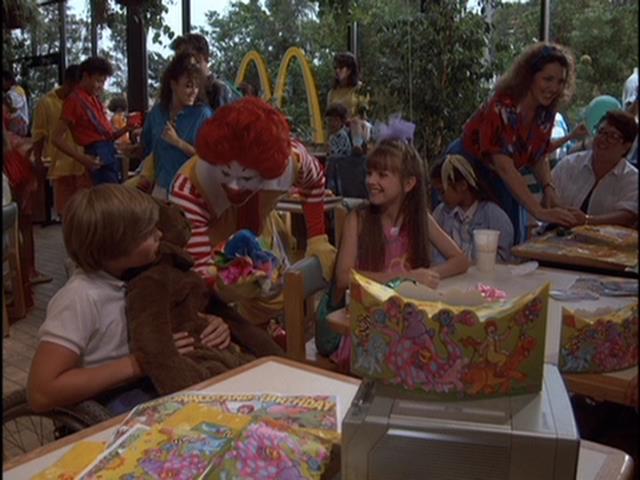
Of course. the argument could be presented that if a group of characters are using iPhones and driving a Prius’, then that’s simply a fair representation of those sorts of people in real life. Now, in the case of Mac and Me where the character of Ronald McDonald (who won a Razzie for ‘Worst Newcomer’) is a part of the ‘plot’, and Coke is consumed at a frequency that would make the most cynical dentist smile, it’s hard not to find the product placement a bit on the nose.
As an imitation of E.T., Mac and Me delivers highly accentuated product placement notes as if it were aiming to be a parody, with its existence further informing the parodic tone it may have been aiming for. E.T. famously asked the Mars company if they could use their M&M’s in the film, which of course, Mars declined, paving the way for Hershey’s to step in with their similar crispy shelled candy. Reese’s Pieces took the place of M&M’s and their sales increased after the film was released. Besides the fact that the ‘Mac’ in McDonald’s makes up part of the title (the and Me part stolen from a working title for E.T. – E.T. and Me), there is the ludicrously glorious dance sequence at a kids birthday party that announces the end of the second act that essentially takes the concept of product placement and says, product placement getting you down? Ok, fine then, here’s a ten minute ad for McDonald’s birthday parties. (Full disclosure: I used to work at McDonald’s and run kids birthday parties and they never, ever involved singing and dancing and flying aliens in bear costumes.)
There’s no questioning that the huge financial failure of Mac and Me hampered any future big screen outings for Ronald McDonald – (the film was estimated to cost $13 million, and only took in $6.8 million at the box office). According to this Slate article there was no ‘quid pro quo’ arrangement with McDonald’s to have such an extensive advertisement in the film, but if that’s the case, then why are there reports that there was a profit sharing arrangement with McDonald’s to have some of the films taking go to the Ronald McDonald House Charity?
This is not to say that films can’t be associated with charities, they just need to be clear of their intentions from the outset. Many films that are associated with charities, do so after the film has been finalised, often utilising a charity to help promote the film. There is a symbiotic relationship that can mutually benefit both the film and the charity if it’s done with enough tact and care. Take the release of Lion for example, where the producers have agreed to match up to $US50,000 in donations to help lost children in India. The film is in itself a parable about a lost child growing up and finding his way home, and it is a legitimate issue in the world that could benefit from greater exposure and greater donations.
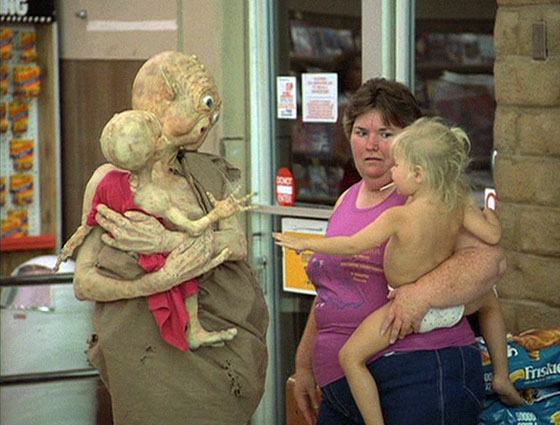
Mac and Me though, while it does have a disabled lead who no doubt may have benefited from Ronald McDonald House as a kid, does not ever announce within the film a possible association with the charity. Granted, there are still many who look at the fast food charity with one eyebrow raised, dubious of its seemingly pure intentions. It doesn’t help that the shoehorning of McDonald’s into the film feels so blatantly, well, commercial. If the ‘pure intentions’ were to have a profit sharing agreement with McDonald’s and its kids charity, then why not make reference to it? Why not have a throwaway line from Eric’s mum in reference to the possible care that the charity provided for them? This is too much to ask from a film that was constructed by a committee. Why bother with such trivial things when you have Coke and Big Macs to push?
Theoretically, the films failure should have been the end of product placement in films as a tool to further subliminally push products onto people. Time has shown that that’s not the case though, with films like Harold and Kumar Go to White Castle and the Transformers series all proudly pushing whatever fast food or bottled Chinese water they attempt to sell. It’s not cheap to make films, so if production companies can reduce their initial outlay of finances, then so be it. (For a further assessment of product placement in films, give David Mamet’s underrated State and Main a watch.)
Does the product placement within Mac and Me destroy the film completely and make it an unwatchable effort altogether? For many, I’m sure it does. Just like that store clerk coming by and asking if you need help every five minutes, the unceasing product placement can be nauseating. For me though, maybe my tolerance of product placement and the fact I grew up with this film, helps me look past the inclusion of such things. I’m able to explain away the reasoning why the only food that Mac eats is Skittles, washed down with a heavy dose of Coke, because Skittles fit into the shape of his mouth, and the Coke he drinks is similar to whatever nourishing fluid is on his home planet – and this is all because I find the rest of the story hitting mostly the right notes. (One does have to ask though, without a discernible jaw, how exactly does Mac chew the gum at the end of the film?)
Where E.T. succeeded as a parable about a child finding an unlikely friend, it also managed to succeed with some truly terrifying moments (particularly the way E.T. screams in fright in the cane fields). As a youngster growing up, I oddly found myself gravitating towards the lesser of the two films. Something about the ending stuck with me over the years. No, not the big bubblegum ‘we’ll be back’, but what happens before that. Yep, Mac and his family becoming US Citizens. They’re not sliced to pieces in an alien autopsy that provides humans with an understanding of their anatomy, they’re made equal with everyone in the United States.
What a stunning, amazingly progressive idea.
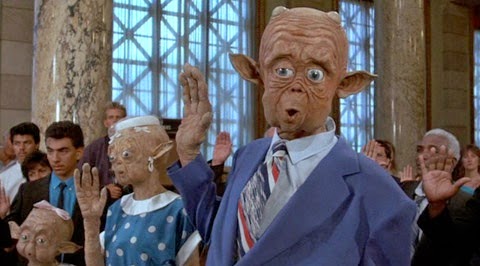
In this post-Trump, anti-immigration world, it’s easy to become cynical about supplanting a concept like pro-immigration onto such a cynical, commercially constructed film like Mac and Me. Now, I’m not going to make some wild leap and compare the aliens here to those of fleeing Syrian refugees – far from it. For starters, Mac’s family aren’t fleeing a war torn country, but are instead unsuspecting stowaway’s on an American spaceship. They didn’t ask to be dragged into the country, but now they are there, they have to do their best to survive.
Let’s take a look at what’s working against Mac’s family in their path to becoming citizens of America, and of course, the world.
First up – they’re aliens. It’s unprecedented that aliens would not only visit Earth, but eventually wish to become citizens of Earth. One could ask, what does 1980’s Earth offer for these foreigners, with the Cold War raging on? To what benefit is it that they would wish to call Earth home? The question is never raised whether they could have gone back home – possibly that would have been answered in the sequel.
Secondly – their otherworldly abilities (such as turning into Mr Fantastic and stretching themselves across long distances, and interacting with electrical objects, causing them to explode), could be perceived as an attack. In one of the first interactions between Eric and Mac, Eric wakes to find the American flag doing circles at the end of his bed – a sign of Mac’s unknowing acceptance of American patriotism. Of course, the flag is attached to a remote control car that Mac happens to be controlling with his abilities.
Later, Mac manages to cause a variety of televisions to explode in a glory of sparks as he races away from the agents chasing him, even going so far as to lock the doors behind him as he and Eric make off on Eric’s wheelchair. It’s unclear whether this is an act of defense or a response to the fear he’s feeling, but it is clear that any creature that can cause such destruction is one to be cautious about. Yet, even after being involved in a massive explosion that causes extensive destruction, these beings are given a free passage to America. If this were set in modern day America, there’s no denying that they wouldn’t be given such a glorious opportunity.
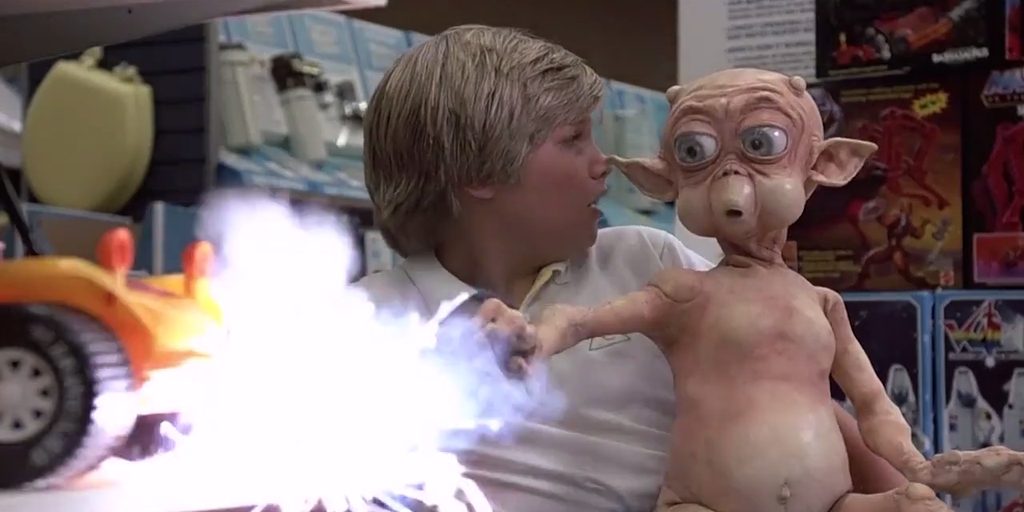
After the climactic explosion and altercation with the police, Eric is blasted from his wheelchair, effectively killed. For a moment there, this parable about a boy and his alien friend looks to have a devastating finale. Except, predating Robert Patrick’s walk from the burning remains of a truck in Terminator 2: Judgement Day, Mac and his family stroll out of the flaming wreckage and manage to revive Eric through the same ability that got them in this situation. There is a suggestion of spirituality, as they appear to give Eric reiki, returning him to life.
Thirdly – there is no clear indication what value to society these aliens will be. They can’t speak English, they have no discernible skillsets, and their curiosity is a mighty big concern if it’s not reined in. After all, if the father figure in the group can turn a tyre iron into a knot, who’s to say he wouldn’t tear the lock off a bank vault? That comment, of course, works on the assumption that he would understand the value of currency.
Which brings us to point four. They don’t speak. Not ‘they don’t speak English’, but they literally don’t talk. The way they communicate is through whistling and seemingly through telekinesis. Now, I’m not going to suggest that Eric is on par with Amy Adams character in Arrival, but he does manage to communicate with Mac through means other than English.
With all of these facts evident to the US government, they still agree to these aliens becoming citizens. Whether like in Josh Trank’s Fantastic Four (don’t worry, I won’t be writing a 3000 word piece defending that film, there’s only so many hills one man can die on), the US government is keeping these individuals around for their possible benefit against invading forces or not is unsure. Part of me wishes that the sequel to Mac and Me would have focused on the alien family being used as covert spies, investigating Russia after being smuggled in in a vacuum cleaner. Maybe the gritty 2020 remake will cover this.
Digression aside – there is a parallel that can be applied to the optimism some of us instill in our governments. Yes, refugees may not have the skills or language understanding that citizens of America do, but there is enough evidence to show that if they’re provided with the resources to become a useful part of society, then they will do just that. One of the common arguments against refugees or immigration is that they don’t partake in American/applicable countries values. Yet, from the outset, Mac and his family do nothing but embrace American culture. They literally live on American food. Without it they will die. Mac attends a child’s birthday party and dances along with everyone. They go grocery shopping as a family. Most importantly, they are a united family who work together to help each other, and by virtue of that, they are helping the country they live in.
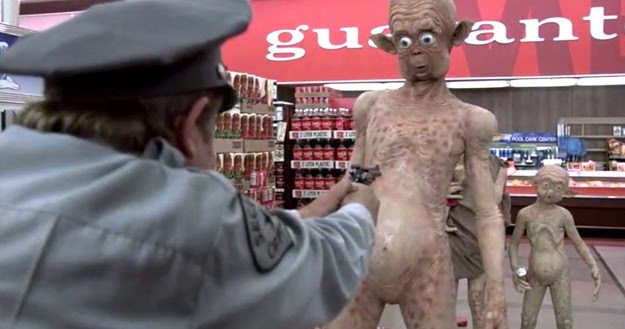
Keeping the rose tinted glasses on a little longer, mostly everyone who comes into contact with Mac and his family is sympathetic to their situation. They don’t recoil in disgust or call them ugly – there is no judgement of their physical appearance. They are who they are and no more.
This philosophy extends to the casting of Calegory who slots into the role that could have gone to an able bodied person but did not. Again, there is no judgement of him from other characters, or the film itself. When it comes to the action scenes, Calegory throws himself wholeheartedly into the role, doing many things that able bodied actors would do.
The oft-joked about stunt of him rolling down the hill and crashing into the river behind their house is a little amusing, but Calegory thoroughly enjoyed his scene in the water. Sure, Eric’s mum could have chosen a better location to set up house than one that doesn’t back onto a steep hill, but it’s forgivable since she probably never expected him to go that far, and most likely had much on her mind when organising a new house. A stunt double did the epic launch into the river, but Calegory gladly kept himself afloat in the water as Mac came and ‘rescued’ him. Calegory also opted to do some of the more dangerous stunts later in the film, such as when Eric and Mac outrun the officers chasing them, rolling into oncoming traffic. Some of the cars come awfully close to clipping Eric, but they move out of the way just in time. He manages to hold onto the back of a truck, using the speed of the truck to pull him to safety. This is an aspect which has been shown in many films, with cyclists or roller skaters being pulled along by a faster vehicle. Is there any difference between them and a person in a wheelchair other than the thing propelling them being associated with being disabled?
Granted, said ‘person’ is a kid, and of course, kids aren’t allowed to do their own stunts because really, who wants to be responsible for the death of an untrained ‘stuntkid’. The enthusiasm that Calegory shows in these scenes is palpable, given his history of having many different surgeries to repair the impact of the spina bifida that he was born with. In an interview, his mum talks about how he would race around on a skateboard while in a cast. Ever enthusiastic about the feeling of moving and being active.
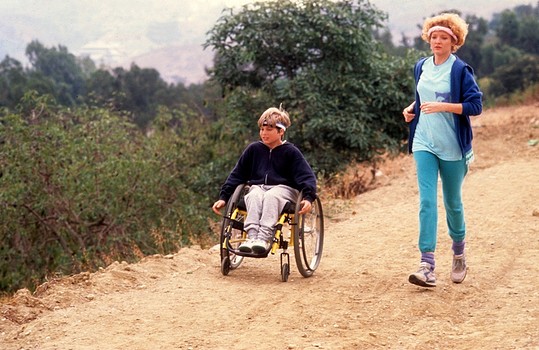
Calegory’s cinematic Mum, Janet Cruise (Christine Ebersole) is ever supportive of Eric, wanting the best life for him, while at the same time also striving to make a path forward for herself. The scene where she returns home to find her living room trashed, with the front door having been partially sawed open by a curious Mac, shows her on the brink of frustration and despair. How is she supposed to manage on her own? Naturally, her sons try to explain that it wasn’t them and was the ‘space creature’, but she’s not having any part of it.
At home in a new town, she goes jogging with her son, creating a strong bond between herself and Eric, possibly working to help curb any problems that may arise from the loss of the father figure in the family. Janet finds a job working at Sears – another product placement – and in a touching moment of nervousness, asks her colleague ‘have you worked in lingerie long?’ That is, before Eric and Mac burst into the store causing all manner of destruction and devastation. Odds are, Janet won’t be keeping her job at Sears much longer.
The post credits consequences for Janet are even more distressing. Not only is she a single mum trying to raise two growing boys, but she now has an illiterate, eternally soda consuming alien family to look after. If there’s a bonus though, it does appear that they can at least dress themselves, and the father figure can drive a car. (A convertible no less, the ultimate in American success.)
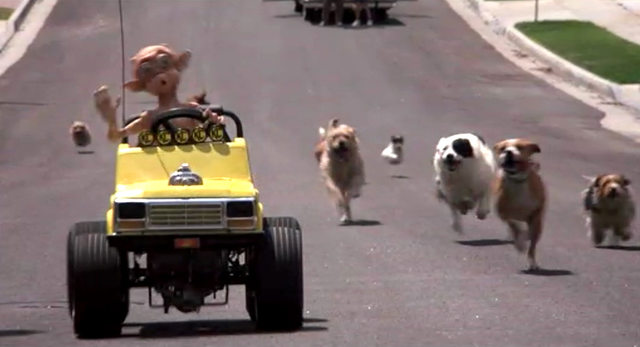
One of the elements that has intrigued me as a film viewer is what baggage we bring to the films we watch. As films age, we can implant our own perceived agendas onto the film, conjuring up a narrative or metaphor that the film may never have intended to have in the first place. Not every film needs to be an allegory for something, they can just exist as a piece of pure entertainment. In the case of Mac and Me, the film itself – for me at least – is pure entertainment. However, my enjoyment in the film is heightened by the pro-immigration, ultra-tolerant, yet still heavily capitalist utopia agenda that the film pushes.
Think of Mac and Me like an anti-They Live. The aliens are in plain sight, and you know what, that’s ok. Keep on consuming, keep on living and everything will be fine. This is a surface level comparison of course, I understand there’s a lot more depth to They Live than there is to Mac and Me – after all, Carpenter’s classic is genuinely trying to say something about our society. The pro-capitalist, pro-immigration agenda that Mac and Me appears to subscribe to is obviously a pure fantasy, the two ideas would never truly work in a modern society, yet, here they are, coexisting just fine.
Some people get greater enjoyment from Ferris Bueller’s Day Off thinking that the whole film takes place in Cameron’s head, or that James Bond is actually a codename for the different agents taking up the number 007, or that Drag Me to Hell is all about eating disorders. If it helps you to enjoy a film more, then so be it! If anything, the endless discussions of fan theories about films are part of being a lover of cinema. It’s exciting and enticing to conjure up extraneous ideas for a film that may not be entirely evident within the film itself.
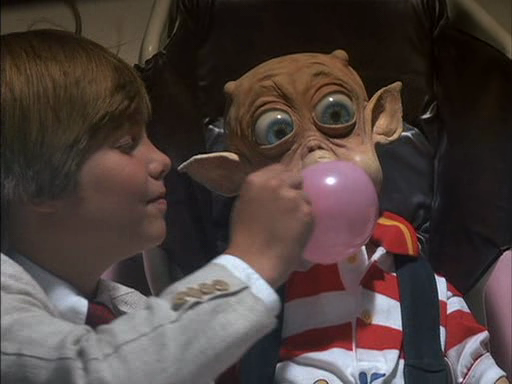
If anything, this long piece has managed to show how far one can stretch a concept and bend a film to fit a specific reading. I can guarantee without a doubt that Stewart Raffill did not embark on directing Mac and Me with the intention of telling a parable about immigration. Interviews and reviews at the time show that there was an intention to help tear down prejudices regarding disabled actors on film; and one can only imagine what the landscape of cinema would have been like if this was a huge financial success. If bending a films concept helps your appreciation of said film, then isn’t that a positive thing? Isn’t that just part of what makes film watching fun, and entertaining. For all the heated discussions I’ve had about House of Sand and Fog being a haunted house story, there are equally the same amount where people claim that Drive is a film about a superhero. Am I right with Mac and Me being a film about immigration? Not entirely, but if that’s the reading I get from the film, then is that so bad?
After all of this, does this make Mac and Me a better film than what is on screen? For me, yes, I think it does. I feel that the film has, over the years, become an unfair punching bag and an easy punchline of jokes. Is it the worst film ever made? No, definitely not. Will this long, long piece change anyone’s mind on the film? No, probably not. But it may at least encourage somebody to look at the lesser films that cinema has to offer in a different light.
